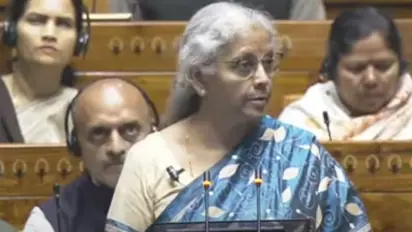'UPA inherited healthy economy, made it non-performing': Centre's 59-page White Paper

Synopsis
The report contends that while the UPA leadership often takes credit for the 1991 reforms, they abandoned these initiatives after assuming power in 2004. This move, according to the white paper, drastically transformed a healthy economy into a non-performing one.
The Centre on Thursday (February 8) unveiled a scathing attack on the Congress-led United Progressive Alliance government's economic leadership in a white paper presented in Parliament. According to the report, the UPA administration, which inherited economy poised for further reforms, allowed it to turn non-performing during its ten-year tenure. The white paper, which was tabled by Union Finance Minister Nirmala Sitharaman in the Lok Sabha, addresses various aspects, highlighting the banking crisis, macroeconomic foundations, and the response to the 2008 Global Financial Crisis.
FM Sitharaman tables 'White Paper on Indian Economy' in Lok Sabha; discussion to take place on Feb 9
The 'White Paper on the Indian Economy' revealed that the UPA government, despite inheriting a robust economy ready for additional reforms, allowed it to languish during its decade in power.
The report contends that while the UPA leadership often takes credit for the 1991 reforms, they abandoned these initiatives after assuming power in 2004. This move, according to the white paper, drastically transformed a healthy economy into a non-performing one.
One of the critical legacies of the UPA government highlighted in the white paper is the banking crisis. The document states that the Gross Non-Performing Assets (GNPA) ratio in Public Sector banks soared during the UPA era due to political interference in commercial lending decisions.
Moreover, the UPA's attempts to maintain high economic growth post the 2008 global financial crisis severely undermined macroeconomic foundations, according to the report.
The white paper emphasizes that the UPA government, in its pursuit of sustaining high economic growth after the 2008 global financial crisis, substantially weakened the macroeconomic foundations. Economic observers noted profound mismanagement and indifference during this period, with the UPA failing to undertake crucial economic, social, and administrative reforms necessary for India's long-term economic potential.
Centre fires back: India rejects Ottawa's allegations, accuses Canada of internal interference
The report further said that during its term, the UPA government failed to capitalize on the favorable economic conditions it inherited in 2004. Despite a growth rate of 8 percent, the UPA's economic mismanagement led to a non-performing economy.
Stay updated with the Breaking News Today and Latest News from across India and around the world. Get real-time updates, in-depth analysis, and comprehensive coverage of India News, World News, Indian Defence News, Kerala News, and Karnataka News. From politics to current affairs, follow every major story as it unfolds. Get real-time updates from IMD on major cities weather forecasts, including Rain alerts, Cyclone warnings, and temperature trends. Download the Asianet News Official App from the Android Play Store and iPhone App Store for accurate and timely news updates anytime, anywhere.